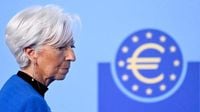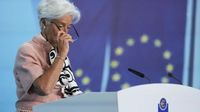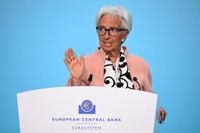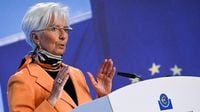On Thursday, April 17, 2025, the European Central Bank (ECB) made a significant move by cutting interest rates in the Eurozone by 0.25%, bringing the rate down to 2.25%. This marks the lowest level since February 2023 and is the seventh reduction in a series of cuts initiated since June 2024, when rates were as high as 4%. The decision comes amid escalating trade tensions primarily driven by the United States' tariffs under former President Donald Trump, which have raised concerns over economic growth across Europe.
Christine Lagarde, the president of the ECB, addressed the media following the decision, stating that the trade tensions have increased "downside risks to economic growth." She emphasized the need for a flexible monetary policy approach, indicating that the ECB would make day-to-day decisions based on incoming data due to the "exceptional uncertainty" surrounding the current economic climate.
Lagarde's comments highlight the precarious position the Eurozone finds itself in as it navigates the fallout from a global trade war. The ECB's latest move was initially expected to be a pause in rate cuts; however, the ongoing economic turmoil prompted a reassessment of monetary policy. The ECB aims to stimulate growth while managing inflation, which has been declining but remains a concern.
In her remarks, Lagarde pointed out that although the Eurozone economy has shown some resilience to global disturbances, the outlook has deteriorated due to the intensifying trade tensions. She urged the European Union to prioritize completing the capital markets union, develop a legislative framework for a digital euro, and ensure sustainable public finances.
"The process of disinflation continues to progress," Lagarde stated, noting that inflation in the Eurozone fell to 2.2% year-on-year in March, approaching the ECB's target of 2%. However, she warned that the trade war could further weaken growth prospects by reducing consumer and business confidence, potentially leading to tighter financing conditions.
According to the ECB's statement, the decision to cut rates was unanimous, with no members advocating for a more aggressive 0.5% reduction. Lagarde confirmed that the central bank's focus remains on ensuring that inflation stabilizes around the 2% target while adapting to the rapidly changing economic landscape.
As the ECB adjusts its strategy in response to external pressures, it is also crucial for member states to enhance productivity and competitiveness within the Eurozone. Lagarde underscored the importance of strategic investment and structural reforms to navigate the current challenges effectively.
Meanwhile, across the Atlantic, U.S. Federal Reserve Chairman Jerome Powell has expressed concerns over the implications of Trump's tariffs on both inflation and employment. Powell noted that the tariffs are exerting upward pressure on inflation expectations and could delay the Fed's goal of lowering inflation rates. This divergence in monetary policy between the ECB and the Federal Reserve is significant, especially as the Fed maintains higher interest rates, currently between 4.25% and 4.5%.
Trump's administration has been critical of the Fed's cautious approach, with the former president calling for Powell's dismissal, labeling his reports as a "complete disaster" and urging for immediate rate cuts similar to those enacted by the ECB. This political pressure adds another layer of complexity to the already intricate relationship between monetary policy and political influence.
In light of the evolving economic situation, analysts are closely watching the ECB's next moves. Some experts anticipate that further rate cuts may be necessary to bolster economic growth, especially if the trade war escalates. Claudia Fontanive-Wyss, a fund manager at Vontobel, suggests that as rates approach neutral levels, the ECB may need to eliminate references to restrictive policies altogether.
As the Eurozone grapples with the repercussions of external economic pressures, the ECB's recent rate cut reflects a broader strategy to mitigate risks and support growth. With the ongoing uncertainty surrounding trade relations, the central bank's decisions will play a pivotal role in shaping the economic landscape for member states in the coming months.









